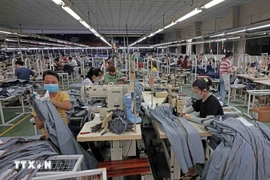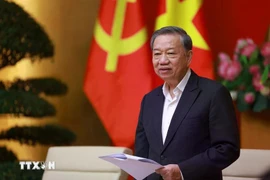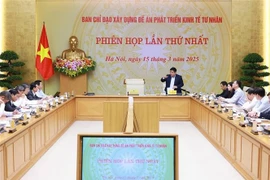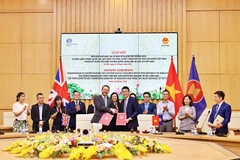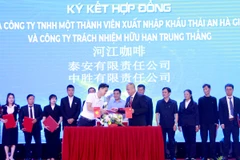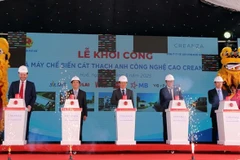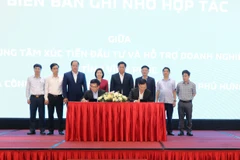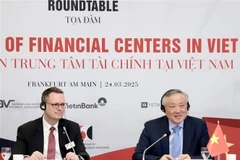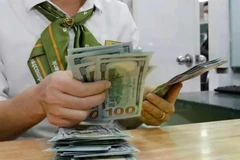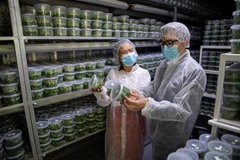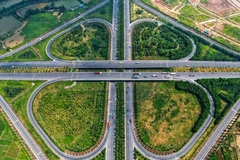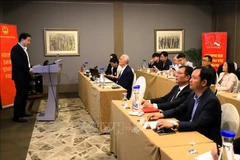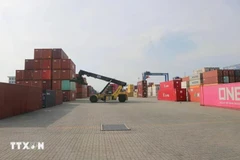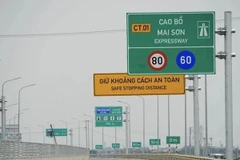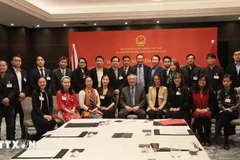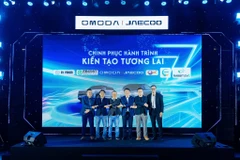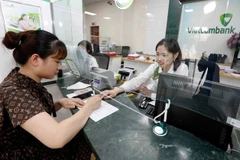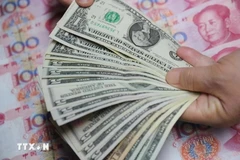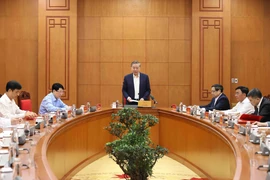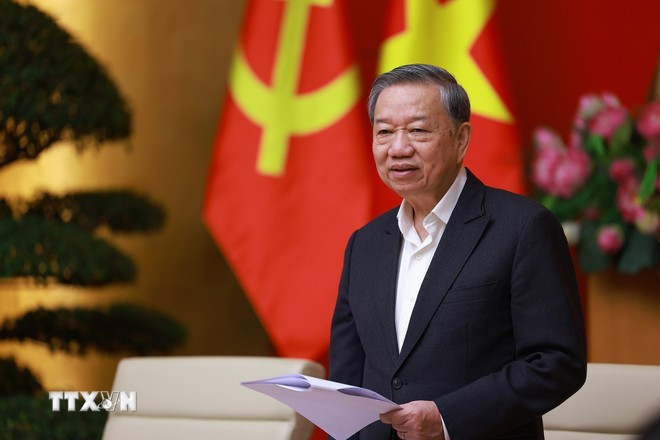
Hanoi (VNA) – “The private sector must be the pioneering force in the new era, successfully implementing the industrialisation – modernisation of the economy, enhancing the national competitiveness, demonstrating social responsibility, helping to improve people's lives, participating in building a civilised, modern society, and contributing to building a dynamic and internationally integrated Vietnam.”
This message from Party General Secretary To Lam in his recent article "Developing private economic sector – A lever for a prosperous Vietnam" marks a turning point in the awareness about the private economic sector’s important role while touching on the aspiration for groundbreaking development of the country's most dynamic economic industry today.
Numbers speak louder than words
Vietnam's history has recorded the imprint of the private economic sector, existing in various forms such as private enterprises, limited liability companies, joint stock companies, and individual business households, as well as the names of merchant families from very early on. As the Party and State recognised the position and the role of the sector in the policy to develop a multi-component economy during the Doi moi (renewal) period, it has unceasingly developed stronger, becoming one of the drivers of the country's rapid economic growth.
Particularly, following the 10th National Party Congress in 2006 when the private economic sector was encouraged to develop without size restrictions, it has made significant contributions to the country’s socio-economic expansion and international integration. While in the early stages of Doi moi, the private economic sector played a secondary role, mainly relying on the state sector and foreign direct investment (FDI), the sector has risen strongly, becoming one of the most important pillars to foster the national economic growth in the past two decades, especially when the Politburo issued Resolution No. 09 in 2011 and the Party Central Committee issued Resolution No. 10 in 2017 regarding the development of the private economic sector.
Notably, institutions, mechanisms and policies for the sector’s development have been perfected since 2010. According to Article 51 of the 2013 Constitution, Vietnam's socialist-oriented market economy has many forms of ownership and economic components, in which the state economic sector has played a leading role and all economic components are important constituent parts of the national economy, equal, cooperative, and competitive according to law. The State encourages and creates conditions for entrepreneurs, enterprises, individuals, and other organisations to invest, produce, and do business. Additionally, the lawful assets of individuals and organisations investing, producing, and doing business are protected by the law and not subject to nationalisation.
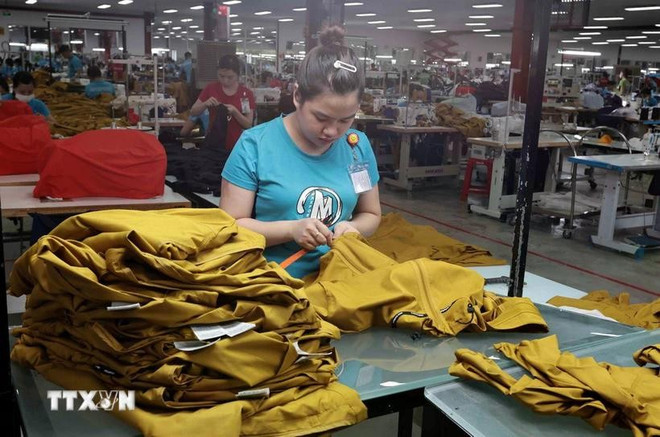
According to Phan Duc Hieu, permanent member of the National Assembly’s Committee for Economic and Financial Affairs, mechanisms and policies for the sector have been continuously improved through the issuance of a system of laws, including the Law on Private Enterprises and the Law on Companies in 1990; the Law on Enterprises in 1999, 2004, 2014 and 2020; the Law on Investment in 2004, 2014, and 2020; the Competition Law, the Law on Public-Private Partnership Investment, the Bidding Law, and the Law on Support for Small and Medium Enterprises.
With these laws, Vietnam has formed a common and unified legal framework for the establishment, organisation, and operation of business organisations applicable to all business entities regardless of ownership forms, and increasingly aligned with international regulations and rules.
The private economic sector is free to compete and be treated equally under the laws compared to the state and FDI sectors. Discrimination in access to resources and state support for the private economic sector has gradually been removed, creating favourable conditions for private investment development through improvements in tax policies, technologies, public administrative procedures, and more.
The "telling numbers" of the private economic sector - nearly 1 million enterprises, 5 million individual business households, contributing 51% of GDP, more than 30% of the state budget, creating more than 40 million jobs (accounting for more than 82% of the total workforce in the economy), and contributing nearly 60% of society's total investment capital - demonstrated the private economic sector's role as a leading pillar of the economy.
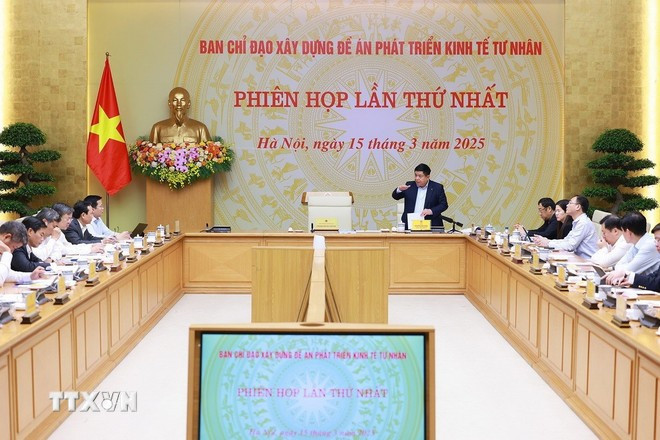
Persistent challenges faced by private economic sector
In his article, Party chief To Lam noted that despite its increasingly significant contributions, the private economic sector has still faced many barriers hindering its development, preventing breakthroughs in scale and competitive edge.
At a working session with the Party Central Committee’s Commission for Policies and Strategies earlier this month, the Party leader underscored that changing perceptions is necessary to transform treatment and actions for the private economic sector.
For a long time, state-owned enterprises have been considered the "backbone" and FDI enterprises have been regarded as the "boost" of the economy, while private enterprises, despite their large contributions, have still been viewed a "supplementary" component. This prejudice exists not only in thinking but also infiltrates policies and the "treatment" for businesses.
On the other hand, the private economic sector itself also has existing issues such as limitations in scale, potential and competitiveness. There is also a lack of leading firms in important industries while linkages within the sector and between it and other economic domains remain weak. Besides, a very large force of more than 5 million household businesses has been unwilling to grow due to constraints and concerns about regulations and procedures.
Furthermore, many entrepreneurs with bad business ethics, culture, law compliance, and social responsibility have violated laws, pursued personal interests, and caused damage to the economy, somewhat reducing public trust.
The era of private enterprises' rise
Over the past time, Prime Minister Pham Minh Chinh has held dozens of meetings with the business community, conveying a strong message of the Government’s specific, determined, and substantive companionship with the firms, particularly the private sector.
Not only encouraging and promoting entrepreneurs' contributions, listening, sharing, and exchanging with businesses to remove obstacles, as well as discussing tasks and solutions for private enterprises to develop more strongly, the Government leader admitted that institutions are the "bottleneck of bottlenecks," but also the "breakthrough of breakthroughs" in private economic development today. Accordingly, institutional changes in the sector will be the premise for breakthroughs, enabling the private economic sector to take off with the nation's rising era.

The Party Central Committee’s Commission for Policies and Strategies has proposed 10 strategic solutions to create breakthroughs for the development of the private sector in the coming time. They aim at creating a favourable and open business environment, enhancing access to resources, promoting technological innovation and human resources development, and improving capabilities for businesses and entrepreneurs. At the same time, there are breakthrough solutions to quickly remove fundamental bottlenecks that have persisted for many years.
Chairman of Phu Thai Group Pham Dinh Doan underscored the need for joint efforts from the Government, the business community and the people for breakthrough development, stating just one day late, enterprises can miss countless opportunities.
Chairwoman at PwC Vietnam Dinh Thi Quynh Van said she believed that along with administrative procedure reforms, private enterprises need stable, comprehensive, and consistent policies, as well as a new market approach. They must "venture into the big sea" and have international qualifications, according to Van.
Meanwhile, Dr. Tran Dinh Thien, a member of the National Council for Financial and Monetary Policy Consultation, said this is the time of golden opportunity for private enterprises to make groundbreaking development after 40 years of renewal.
No superpower lacks a developed private economic sector, such as the Republic of Korea with Samsung, LG and CJ, and Japan with Honda, Toyota and Sony. Therefore, developing the private economic sector is a key task of the Party and State in the current period, and also the aspiration for groundbreaking development of private enterprises so that they will be able to take off in the new era – the era of the nation’s rise./.
